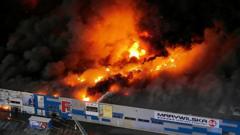In recent statements, Poland's Prime Minister Donald Tusk publicly accused Russian intelligence agencies of deliberately setting a massive fire that devastated the Marywilska shopping centre in Warsaw last year. In a post on X, he asserted that Poland has "firm evidence" pointing to the blaze as a result of arson ordered by Russian special services. Tusk revealed that some perpetrators are already detained, while others linked to the crime have been identified and are currently being pursued.
The fire, which occurred in May 2024, resulted in the destruction of around 1,400 small businesses, significantly affecting the Vietnamese community in Warsaw. Following a thorough investigation lasting nearly a year, Polish authorities concluded that the arson was orchestrated by an unidentified individual in Russia. Poland's justice and interior ministers issued a connecting statement detailing the organized nature of the actions performed by the detained individuals, attributing these actions to a specific figure residing in Russia. They also noted cooperation with Lithuania to track down additional suspects involved in similar incidents.
The accusations come amidst heightened tensions following Russia's full-scale invasion of Ukraine in 2022. Poland has been proactive in detaining individuals for sabotage linked to Russian intelligence, which officials interpret as part of a broader "hybrid war" strategy initiated by Moscow. This method of warfare allows for deniable yet harmful actions against the infrastructure of the opponent without officially declaring warfare.
NATO has echoed these concerns, asserting that Russia's activities in Europe are aimed at dissuading Western support for Ukraine. Moscow has repeatedly rejected these claims of sabotage by its military operations across Europe. This is not the first instance where Russian intelligence has been implicated; in a related development, Lithuanian prosecutors accused Russia's military intelligence of being involved in arson at an Ikea branch in Vilnius last year. The entanglement of Russian actions in such incidents has prompted Tusk to confirm that investigations have linked these arson cases in both Polish and Lithuanian cities to Russian secret services.
The Marywilska shopping centre, which opened in 2010, was home to numerous small shop owners who lost valuable assets in the fire, which also included important documents and cash stored in fear of theft at home. In response to the disaster, a temporary shopping centre was inaugurated by the owners just three months post-fire, allowing around 400 traders to resume their businesses. Additionally, a new alternative shopping center was established in Warsaw, named Modlinska 6D, where traders have relocated their operations.
The fire, which occurred in May 2024, resulted in the destruction of around 1,400 small businesses, significantly affecting the Vietnamese community in Warsaw. Following a thorough investigation lasting nearly a year, Polish authorities concluded that the arson was orchestrated by an unidentified individual in Russia. Poland's justice and interior ministers issued a connecting statement detailing the organized nature of the actions performed by the detained individuals, attributing these actions to a specific figure residing in Russia. They also noted cooperation with Lithuania to track down additional suspects involved in similar incidents.
The accusations come amidst heightened tensions following Russia's full-scale invasion of Ukraine in 2022. Poland has been proactive in detaining individuals for sabotage linked to Russian intelligence, which officials interpret as part of a broader "hybrid war" strategy initiated by Moscow. This method of warfare allows for deniable yet harmful actions against the infrastructure of the opponent without officially declaring warfare.
NATO has echoed these concerns, asserting that Russia's activities in Europe are aimed at dissuading Western support for Ukraine. Moscow has repeatedly rejected these claims of sabotage by its military operations across Europe. This is not the first instance where Russian intelligence has been implicated; in a related development, Lithuanian prosecutors accused Russia's military intelligence of being involved in arson at an Ikea branch in Vilnius last year. The entanglement of Russian actions in such incidents has prompted Tusk to confirm that investigations have linked these arson cases in both Polish and Lithuanian cities to Russian secret services.
The Marywilska shopping centre, which opened in 2010, was home to numerous small shop owners who lost valuable assets in the fire, which also included important documents and cash stored in fear of theft at home. In response to the disaster, a temporary shopping centre was inaugurated by the owners just three months post-fire, allowing around 400 traders to resume their businesses. Additionally, a new alternative shopping center was established in Warsaw, named Modlinska 6D, where traders have relocated their operations.

















